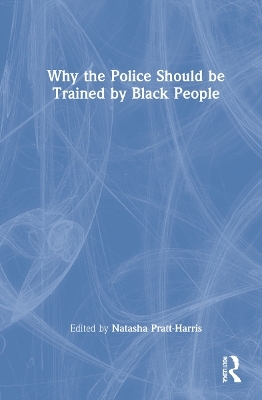
Why the Police Should be Trained by Black People
Routledge (Verlag)
978-0-367-71605-9 (ISBN)
Why the Police Should be Trained by Black People aligns scholarly and community efforts to address how Black people are policed. It combines traditional models commonly taught in policing courses, with new approaches to teaching and training about law enforcement in the U.S. all from the Black lens.
Black law enforcement professionals (seasoned and retired), scholars, community members, victims, and others make up the contributors to this training textbook written from the lens of the Black experience. Each chapter describes policing based on the experience of being Black in the US, with concern about the life and life chances for Black people. With five sections readers will be able to:
Describe the history and theory of law enforcement, policing, and society in Black communities
Critically address how law enforcement and the nature of police work intertwine with race-based societal and governmental norms and within law enforcement administration and management
Understand the variation in pedagogy, recruitment, selection, and training that has impacted the experience of police officers, including Black police officers, and Black people in the US
Explore the role of law enforcement as crime control and crime prevention agents as it relates to policing in Black communities and for Black people
Address issues related to race and use of force, misconduct, the law, ethics/values
Assess research, contemporary issues, and the future of law enforcement and policing, especially related to policing of Black people.
Why the Police Should be Trained by Black People brings pedagogical and scholarly responsibility for policing in Black communities to life, revealing that police involved violence, community violence, and relative lived experiences do not exist in a vacuum. Written with students in mind, it is essential reading for those enrolled in policing courses including criminology, criminal justice, sociology, or social work, as well as those undertaking police academy and in-service police training.
Natasha C. Pratt-Harris is an Associate Professor and the immediate past Coordinator of the Criminal Justice Program and current Graduate Coordinator in the Department of Sociology, Anthropology, and (Criminology & Criminal Justice) at Morgan State University in Baltimore, MD. She is also a trained statistician and methodologist. Dr. Pratt-Harris supervises criminal justice interns, teaches statistics, research methods, juvenile justice, criminology, and criminal justice courses, where she addresses "dis-proportionality" at various stages throughout the juvenile and adult criminal justice system. She co-teaches a Police and Society course based on a Policing Inside-Out Model (Dr. Muhammad Experience) where HBCU students, community members, and law enforcement are enrolled for 15 weeks to collectively address police community relations.
Chapter 1. An Introduction and Recommendation That Police Be Trained by Black People . . .
PART I: EVOLUTION AND FUTURE OF POLICING BLACK PEOPLE
Chapter 2. Black Criminology and Criminal Justice 101
Chapter 3. Due Process and Justice in Black Communities
Chapter 4. Help Without Harm: Black Cops as Police Trainers
PART II: BLACK CULTURE, CULTURAL DIVERSITY, AND SENSITIVITY
Chapter 5. The Media, Popular Culture, and the Portrayals of Black People
Chapter 6. Policing, Black Lives Matter, and the Black Church
Chapter 7. Whiteness, White Privilege, White Supremacy, White Fragility, and Police Brutality
Chapter 8. Cultural Awareness Training for Police Officers: The Intergenerational Ma’at Way
(I-Ma at-Way)
PART III: BEING BLACK AND SOCIALLY VULNERABLE TO CRIMINALIZATION
AND POLICE-PROJECTED NEGATIVE BIAS
Chapter 9. Gender and Sexism: The Criminalization of Black Women
Chapter 10. Policing Black College Students
Chapter 11. The Black Middle Class: Invisible Victims
Chapter 12. Police Contribution to the Wrongful Conviction of Black People
Chapter 13. Ready to Explode: Urban Adolescent Interactions with Police and Law Enforcement
PART IV: HAZARDS AND PUBLIC HEALTH ISSUES IMPLICATED IN POLICE-
BLACK COMMUNITY INTERACTIONS
Chapter 14. Police Initiated Trauma in the African American Community: Policy Implications and recommendations for Reducing the Severity of Force in Police-Citizen Interactions
Chapter 15. Trauma-Informed Policing from the Sociological Lens
Chapter 16. Guns as Hazards to Black Life
Chapter 17. Policing the Black Inmate in Solitary Confinement
PART V: ACCOUNTABILITY FACTORS AND ISSUES IN THE POLICING OF
BLACK PEOPLE
Chapter 18. Past, Present and Future of Policing Styles and Management of Officers
Chapter 19. Police Training by Youth, the Racially Profiled, Former Gang Bangers, and Survivors of Police Brutality
Chapter 20. Militarization and Stop and Frisk: Using Critical Race Theory to Analyze Training of Police Officers
| Erscheinungsdatum | 21.04.2022 |
|---|---|
| Zusatzinfo | 5 Tables, black and white; 7 Line drawings, black and white; 3 Halftones, black and white; 10 Illustrations, black and white |
| Verlagsort | London |
| Sprache | englisch |
| Maße | 156 x 234 mm |
| Gewicht | 571 g |
| Themenwelt | Geisteswissenschaften ► Geschichte ► Regional- / Ländergeschichte |
| Recht / Steuern ► EU / Internationales Recht | |
| Recht / Steuern ► Strafrecht ► Kriminologie | |
| Recht / Steuern ► Strafrecht ► Strafverfahrensrecht | |
| Sozialwissenschaften ► Ethnologie | |
| Sozialwissenschaften ► Soziologie | |
| ISBN-10 | 0-367-71605-4 / 0367716054 |
| ISBN-13 | 978-0-367-71605-9 / 9780367716059 |
| Zustand | Neuware |
| Informationen gemäß Produktsicherheitsverordnung (GPSR) | |
| Haben Sie eine Frage zum Produkt? |
aus dem Bereich


